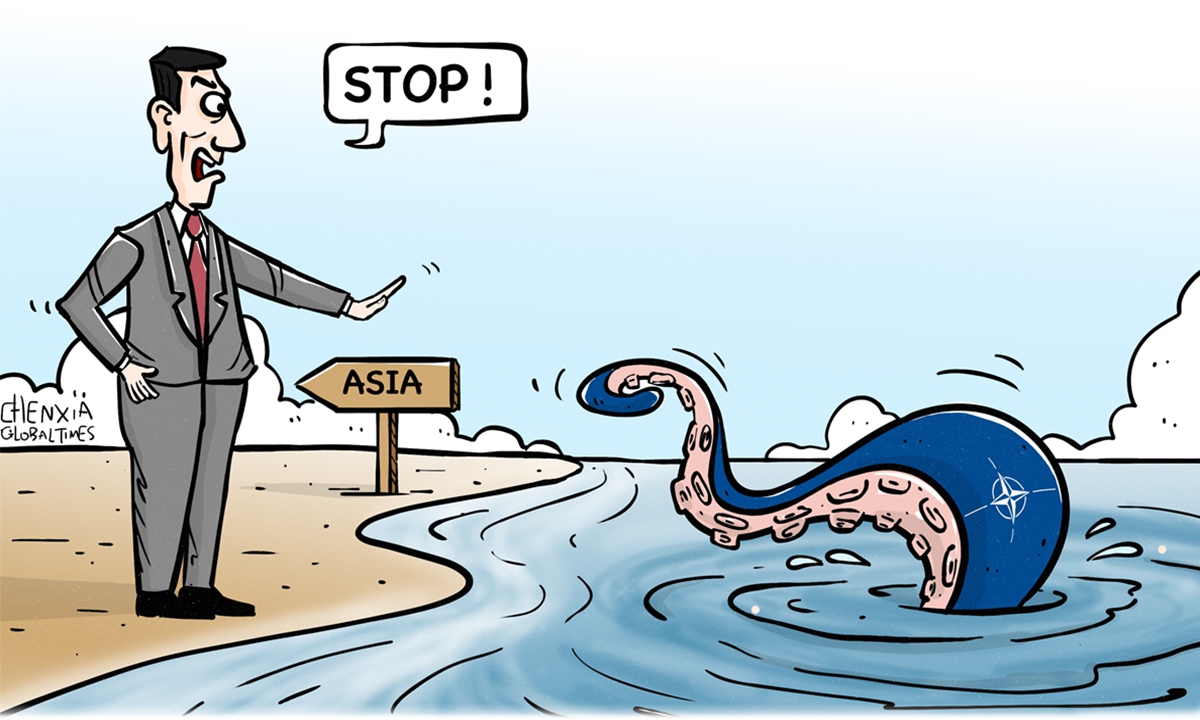
Illustration: Chen Xia/Global Times
NATO's 2030 agenda, as published recently on its website, bears the headline "relations with partners in the Indo-Pacific region." NATO is coming to Asia.
In Tokyo, recently NATO Secretary General Jens Stoltenberg warned "Beijing and Moscow are leading an authoritarian pushback against the international rules-based order. What is happening in Europe today could happen in East Asia tomorrow..." NATO's world view is simple. The world is divided between two kinds of states. Those that defend something called a "rules-based international order," called democracies, and those who don't know what on earth they're talking about, called authoritarians. The remedy for this unfortunate condition is of course, always more NATO.
"More NATO" will come through the institutionalization of the Asia-Pacific Four, consisting of Australia, New Zealand, South Korea and Japan. Their leaders joined a NATO summit for the first time last year. Many analysts believe the four will likely become NATO's extension in Asia. This project of civilizational inclusion comes as NATO's homeland has reverted to the pattern of international relations invented by Europe: murderous ethno-nationalist war prosecuted by a military alliance.
NATO holds its expansion to be a sacred right. It has spread across 14 countries of the former Eastern bloc to the borders of Russia. It has brought war to Europe by encircling a country that suffered about 27 million deaths the last time panzers rolled from the West. It aims to repeat this performance in Asia, against China, with Japan volunteering to be Ukraine.
The end of the Cold War brought a golden opportunity to create lasting peace; a security order in Europe that included Russia. Instead we got more NATO. Asia, too, faces the challenge of building lasting peace. It needs NATO-fication like it needs a hole in the head. This Cold War zombie should have been laid to rest when the Warsaw Pact ended in 1991. The eastward march of the league of the walking dead foreclosed the possibility of building a "common European home" of lasting peace with Russia.
Its other major accomplishments since then have been the destruction of Yugoslavia, Afghanistan and Libya through wars of conquest. Its proxy war "to weaken Russia" is destroying Ukraine, impoverishing Europe, and escalating, without an off-ramp, into an all-out war that threatens all of humanity with nuclear annihilation.
Asia deserves better than this rules-based thuggery. The bloc politics of NATO is, from the perspective of those who recall the tender mercies of its European and Japanese practitioners, nothing but the politics of imperialism in a world it no longer comprehends.
Asia has long needed a security order capable of accommodating the peaceful rise of China, and indeed of the long suppressed Global South, not what revanchists in Japan or neoconservatives in Washington fantasize. The only question was whether the world order would evolve to meet this great challenge or be replaced.
Events since suggest the latter. As late as 2016, then US defense secretary Ash Carter proposed something that sounded sane: a "principled security network" that, in a phrase that might have been plucked from ASEAN, "weaves everyone's relationships together - bilateral, trilateral, and multilateral." Incrementalism like this might have given the US alliance-based system in Asia a few more years of relevance by demonstrating its ability to accommodate the rise of China.
This might, with a dash of strategic ambiguity, have coexisted with China's simultaneous vision of a "New Asian Security Concept" that, while also drawing on existing multilateral institutions and activity, promoted, instead of Cold-War alliances, partnerships based on norms such as the Five Principles of Peaceful Coexistence and the ASEAN Way, all of which emanate from the spirit of the Asian-African Conference of 1955 in Bandung.
Since then we have seen the Western strategic imagination collapse into unipolar mania. Our home region has been remapped for confrontation. The old projection of an "Asia-Pacific" at least dreamt of shared prosperity across the Pacific. It has been swapped for a theater of war under a US unified combatant command, "the Indo-Pacific." China is canceled. "Asia" disappears. A cartography for aircraft carriers, not Asians.
The clown car of NATO-for-Asia is just the latest sign that the post-Cold War security order of Asia is truly over. In its place is a US-led alliance consolidating itself globally for war. The old order is finished because the hegemon that built it has exited the room to pursue more immediate, brutal measures.
We are in a very dangerous time. Asians must come together to build a common and shared home if we are to have a tomorrow at all. ASEAN has a key role to play in making this happen.
The author is a former Malaysian government official and a senior research fellow at Perak Academy, Malaysia. opinion@globaltimes.com.cn




